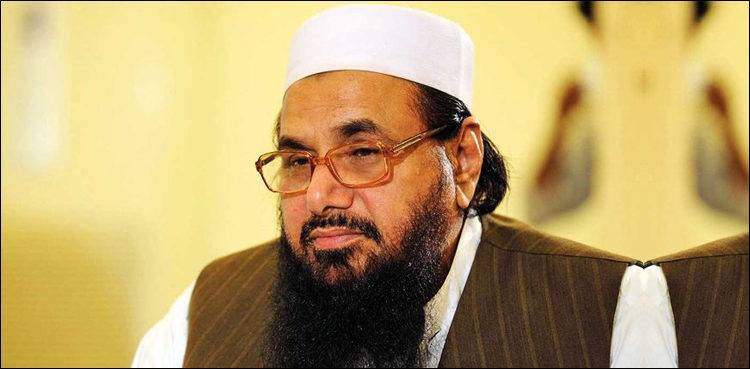Hafiz Saeed sentenced to 11 years in jail
Prison terms of 5 and a half years each in two cases will run concurrently

Stay tuned with 24 News HD Android App

An Anti-Terrorism Court in Lahore has sentenced Hafiz Muhammad Saeed, the head of defunct Jamaatud Dawa (JuD), to a total of 11 years in jail in two terror financing cases.
He and co-accused Professor Malik Zafar Iqbal both were handed a prison sentence of five and a half years and a fine of Rs15,000 in each case.
One case pertained to their being members of a proscribed organization while the other was related to illegal property.
The sentences in the two cases will run concurrently while the convicts have also been granted the benefit of Section 382-B of the Code of Criminal Procedure, which grants a reduction in imprisonment period.
Earlier on Feb 6, the Anti-Terrorism Court (ATC) reserved its verdicts in the two cases and deferred their announcement twice during the last week.
The court directed authorities to keep Saeed under custody until further orders.
ATC judge Arshad Hussain Bhatta announced the verdict and read out the sentence while Hafiz Saeed, who is also the founder of the Lashkar-e-Taiba armed group, was present in the courtroom.
The court recorded the statements of 23 witnesses during the trial of the two cases.
The two men were convicted under the Anti-Terrorism Act (ATA) Section 11-F(2) and 11-N. The first one pertains to membership, support and meetings relating to a proscribed organization.
The second section relates to fundraising for the purpose of terrorism, the use and possession of money or other property for terrorism, funding arrangements which result in money being made available for terrorism, and money laundering.
The convictions came in FIR No 32/2019, registered by the Gujranwala section of the Counter-Terrorism Department (CTD), and FIR No 30/2019, registered by CTD Lahore.
The case filed by CTD's Gujranwala chapter was initially heard in a Gujranwala ATC but was later shifted to Lahore on the orders of the Lahore High Court.
The ATC on Saturday last week deferred the announcement of verdicts in the terror financing cases and decided to hear arguments on Feb 11.
The decision was taken on an application filed by Hafiz Saeed who sought clubbing of all six terror financing cases against him and his co-accused and announcement of the judgment on completion of the trial.
Cases and trials
Hafiz Saeed was arrested by CTD in July last year when he was going to Gujranwala from Lahore.
The arrest came following registration of 23 FIRs in July 2019 against him, JuD Naib Emir Abdul Rehman Makki, and other figures of the banned organistion at CTD police stations in Lahore, Gujranwala, Sargodha, Faisalabad and Multan.
According to the CTD, despite being banned by the authorities, JuD was still operating and financing terrorism through a string of NGOs and trusts.
The banned outfit was collecting massive funds through such platforms as Al-Anfaal Trust, Dawatul Irshad Trust, and Muaz Bin Jabal Trust.
These non-profit organisations were banned in April last year after the CTD found that they had links with the JuD and its top leadership.
On December 11 last year, a court indicted the JuD chief and his three associates namely Hafiz Abdul Salam bin Mohammad, Mohammad Ashraf and Prof Zafar Iqbal on terror financing charges.
Saeed and Prof Zafar Iqbal were later indicted in a similar case on December 20.
The cases were filed by CTD Lahore and Gujranwala chapters.
FATF Pressure
The crackdown against Hafiz Saeed, whom India alleges of involvement in Mumbai Attacks, and his associates followed a warning by the Paris-based Financial Action Task Force (FATF) to Pakistan to deliver on its commitments to curb terror financing and money laundering.
The government had announced a ban on JuD and Falah-e-Insanyat Foundation (FIF) to partially address the concerns raised by India that Pakistan supported these and six similar organisations, including Jaish-e-Mohammad (JeM) or at least considered them low-risk entities.
The law enforcement agencies over the next few weeks had intensified their crackdown on JeM, JuD, FIF and other banned outfits, and arrested more than 100 activists. Nearly 200 seminaries besides hundreds of other facilities and assets associated with them across the country were taken over by the government.
A 'hero' at home
Hafiz Saeed has been a sore of the eyes of the west and India for long. He has been repeatedly accused by Washington and New Delhi of masterminding the 2008 Mumbai attacks in which 166 people were killed.
JuD is considered by the US and India to be a front for LeT, the militant group directly blamed for the attacks on the Indian financial capital.
Saeed was declared a global terrorist by the US and UN over his alleged role in the Mumbai attacks, though he was tried in Pakistan and acquitted in the case because the prosecution could not present any credible evidence against him.
Even then, he has been repeatedly placed under house arrest and was released in November 2018 after a 300-day-long house arrest.
Hafiz Saeed is regarded as a hero by many in Pakistan for his role in Kashmir jihad.
He has a large following of avowed supporters, besides a general appreciation for his strong and unflinching anti-India stance.
